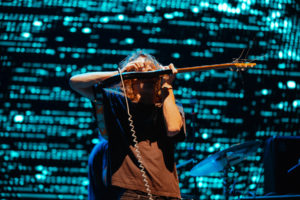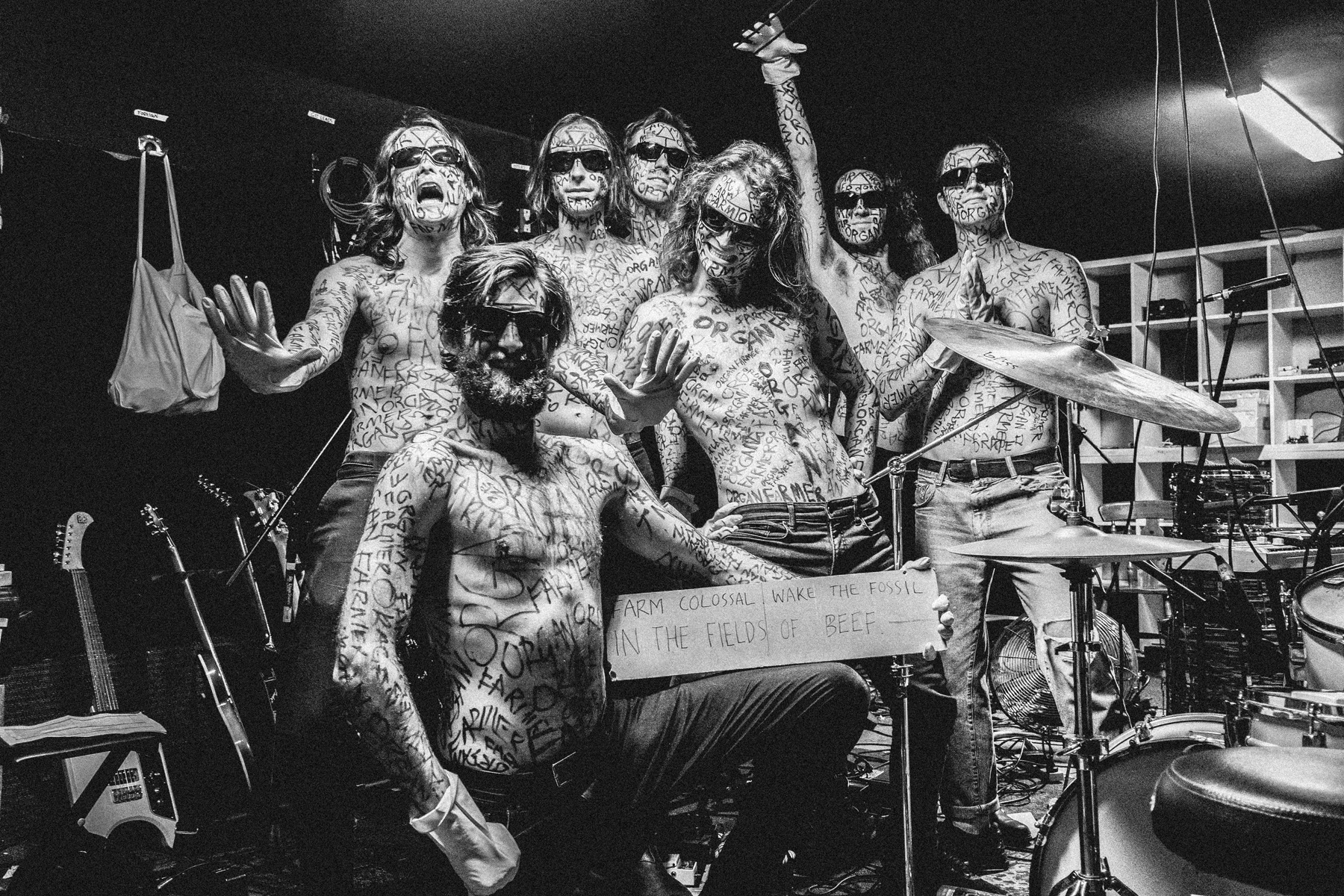It’s hard to catch up with King Gizzard & the Lizard Wizard. You could spend a month tracking them down as their seemingly never-ending tour leads them across the globe—first to Japan, then South Korea, then the United States and Canada—before finally getting frontman Stu Mackenzie on a call, getting him on a rare day off.
You could start listening to the Australian band for the first time now, right now, and you’d be fifteen genre-hopping albums behind on one of the most prolific, unashamed rock groups of the 2010s. And just when you think you’ve figured out the seven-piece prog-rockers, they’ll drop something like this month’s Infest the Rats’ Nest on you—a banging, thirty-five-minute thrash metal record that purposefully catches listeners by surprise and explores extreme contemporary issues like climate change and global politics in the frame of an even more chaotic vacuum.
“It’s way more visceral,” Mackenzie says over the phone when I finally get him in Boise, Idaho, describing how the raw energy on his band’s fifteenth record came to be. Pausing in between to talk long drives and video games, we spoke with Mackenzie about the band’s second album of 2019, why circumstances led to them exploring new sounds, and how they navigate both our world’s rapid pace and their own.
You whittled down to a three-piece while making Infest in the Rats’ Nest. Why was that?
There’s seven of us, but Ambrose (Kenny-Smith) and Cook (Craig) also play in The Murlocs, so they were super busy and that knocked them out while we were writing this. Lucas (Skinner) just had a baby and Eric (Moore) was super busy with the label (Flightless Records), so it was kind of just Michael (Cavanagh) and Joey (Walker) and I just hanging around the studio like, “What the fuck are we doing? Let’s make some music.”
Part of the reason we made this record was because the three of us were more into heavier music than anyone else. We were like, ‘We might as well make some heavy metal or something [laughs].” There’s quite a few overdubbed contributions from the other guys at the end, but it was the three of us at the core.
I bet there can be some scheduling conflicts with seven adults in a band. How often do you find the situation you’re in dictating the music you’re able to make?
I think the circumstances always dictate the kind of music that you write. You want to think you just make whatever music you want to make, but you have to be open to the universe, so to speak, and let the music come to you. That involves living within your means and living within your circumstances.

photo by Kirby Gladstein
Most people listen to different types of music, but not every artist writes different types. What made you want to explore divergent genres as you did on Rats’ Nest?
Well, the only way that I’ve looked at it is it’s the kind of music that I like. If you looked at my record collection or looked at all my friends’ record collections—musicians or not—everyone listens to pretty broad shit. I might follow up a Donna Summer record with a Megadeth record. I’ll do that and I think that’s kind of normal. I just… like music [laughs]. I want to make records that are like my favorite records. I don’t know if people are so wedded to being a “metalhead” or being a whatever-kind-of-person anymore, the way it used to be. I think it’s just OK to like music now.
“I was like, ‘I feel angry, so I’m going to make the most aggressive music I know how to.’ That’s where this record came from.”
In 2019, everywhere you look you’ll find a new album. Do you take how quickly the world moves now into account?
Right. Probably not overtly or purposefully. The world that we live in is crazy. Change is progressively moving faster. We live in a really crazy time in history and it’s not slowing down. I don’t know how that reflects in music, but music is definitely following those trends. It’s a great time to be a musician, at the moment.
Does the world’s speed affect the pace at which you present your music? This is your fifteenth record in the last seven years.
I think the world moving faster has helped create tools in order for people like us to make records more easily and more cheaply than we could’ve in the past. I don’t know whether there’s any more to it than that for me, but it is easier to make a record than it ever has been. That’s amazing, and it means people can make really amazing records.
The new album revisits a thrash metal sound that’s often identified with past eras of music, but it explores issues lyrically that are more relevant to 2019. Songs like “Planet B” focus on environmental issues, for example. Was revisiting an old sound within a new context something you had on your mind while writing?
There’s two things to that. I think feeling pretty angry about the world, global politics, the environment, that’s something that… I’m not an angry person [laughs]. I’m a pretty chill person, but that stuff makes me angry. I think the most aggressive kind of music that I actively listen to is thrash metal and I still love that shit. I listen to it all the time. I think it was a natural connection of those dots. I was like, “I feel angry, so I’m going to make the most aggressive music I know how to.” That’s where this record came from.
Yeah, that musical bedding makes you hear the lyrics in a different way. You’re hearing this message about the environment in a song that sounds very urgent on its own.
When I’m making music, I very rarely make those connections on purpose. It’s like… it’s way more visceral. It’s like, “I am angry. I make angry music now.”
Ahh, so very brute?
Yes, totally [laughs]. You know what I mean? This is a record where the music and the lyrics came together at the same time, which is not always the case. Usually there’s a theme or an idea first, then the music, then the rest of the lyrics. Or it’s all of the music and then the lyrics separately. “Planet B” was the first song we wrote for the record. That song came together quite a long time ago, halfway through last year or something. It was like, “This isn’t a song, this is an album.” We built a record around that song, in a lot of ways. You could think about it like that. It was extrapolating the raw energy of that track and building a narrative around it and writing a bunch of other songs that could fit on a record that that song was on.
“‘Planet B’ was the first song we wrote for the record. That song came together quite a long time ago, halfway through last year or something. It was like, ‘This isn’t a song, this is an album.’”
Is this exploratory nature something you want to lean into more going forward? Do you find yourselves testing the waters in other genres, now that you’re a veteran band?
I’m not sure. It’s not something I actively think about, but I think when I’m making music I’m either in one of two phases: I’m either finishing a record, which I have been up until finishing Infest the Rats’ Nest, or I’m more open-minded and letting ideas come to me, not worrying about how they fit in any broad context or worrying about how they fit in together stylistically, and just kind of letting ideas come and building up a bit of a collection or library of sounds. That’s where I’m at right now. I don’t know what we’re going to do. We have a bunch of songs that are floating around that are feeling like they could go in a lot of different directions, and maybe we have some songs that might end up being on a couple of different records.
Touring is nice for that. You’re literally exploring. You’re meeting people and you’re talking to people and you’re sort of having a fairly meaningful interaction with the world—maybe more meaningful than you do when you’re at home. There’s something about traveling that… we’re lucky to be able to do this sort of thing, in this day and age, and I think that’s an openness that I feel inspired by. Just open gameplay, walking around on a map. FL







